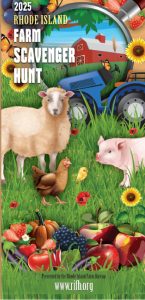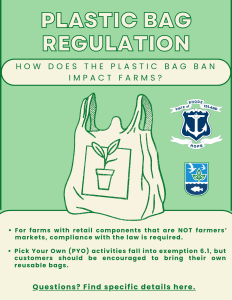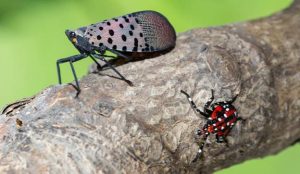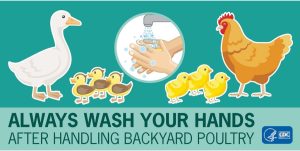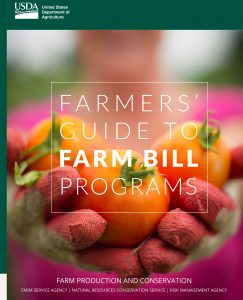What’s Happening in RI Agriculture (and beyond)
Rhode Island Farm Bureau has MOVED!
You can now find us at 780 Victory Hwy Unit 8, West Greenwich.
Exit 14B off of Route 95, we are located 1/2 mile north on the right, in the West Greenwich Plaza, behind the Dunkin’. Stop by to see the new office and get your fresh No Farms No Food and Thank a Farmer 3 Times a Day bumper stickers!
USDA Encourages Ag Producers, Residents to Prepare for Winter Storm Fern
USDA’s Disaster Resource Center and Disaster Assistance Discovery Tool offer easy access to information on programs that support recovery from natural disasters. USDA also encourages residents and producers to contact their local USDA Service Center to determine which programs may meet their needs.
The Disaster Resource Center provides information on how to prepare, recover and build long-term resilience during disasters and emergencies.
The Disaster Assistance Discovery Tool helps you learn which USDA disaster assistance programs might be right for you by completing five simple steps.
2025 RIFB Annual Meeting
Thank you to everyone who joined us on November 6 at the Laurel Lane Country Club in West Kingston for our 2025 Annual Meeting. We had a total of 110 people over the course of the day, with 13 staying for the daytime portions of the meeting only. We had three workshops throughout the day, and all candidates up for re-election at our Business Meeting were voted in by our Voting Members. Six resolutions were also passed by our Voting Members.
Thank you to those who helped at our Registration Table, and to all who donated items for our raffle. Look back for our 2026 Annual Meeting information by late Summer 2026!
2026 Grants are Being Announced!
Northeast Dairy Business Innovation Center: Dairy Farm Improvement & Modernization Grant now open
Northeast SARE & LASA applications OPEN!.
Check out our Grants page for more information!
From hail to heat waves: RI farmers weather a year of extremes (and it’s affecting the corn)

RI Farm Bureau President, Henry B. Wright III, spoke with the Providence Journal about 2025’s challenging growing season.

The 2025 RI Farm Scavenger Hunt has ended.
The 2025 Scavenger Hunt fliers are being reviewed and we will draw the winner soon. Thank you for your patience.
Gift certificates for the 2025 participants will be mailed this in the next couple of months.
Sadly, the 2025 Scavenger Hunt dropped from 30 to 26 farms. It is a lot for farms to participate, they don’t just put out the fliers, stickers and/or a hole punch. They open their farms up to visitors that haven’t necessarily come to make a purchase, but with the hopes that they will. Farms pay the RIFB to be a part of the hunt so that we can cover most of the printing and grand prize costs, and they accept the $5 gift certificates for the participants that earn them. For some farms, there simply are not enough sales to justify being a part of the Scavenger Hunt this year. We get it. The increased traffic comes with increased sales for some farms, while others seem to get people rushing in to get the sticker. We get that too. It’s fun, or at least we hope it is. The idea of getting people out to visit the farms is to increase awareness of Rhode Island’s farms and diverse agriculture. We hope that everyone who participates considers making a purchase, and please remember to be considerate of the business hours when stopping by.
Have a farm you’d like to recommend for 2026? Email us at rifarm@rifb.org with the farm name and location, and we will reach out to ask.

In celebration of International Year of the Woman Farmer, Farm Bureau launched a national Women in Agriculture Study to explore women’s leadership and involvement across the industry, identify barriers and opportunities and provide actionable insights to strengthen engagement and support systems. This study offers a unique opportunity to highlight the significant role women play in driving innovation, leadership and engagement in agriculture both today and for generations to come. This study is open to farmers, ranchers, agribusiness professionals, educators, advocates and others connected to agriculture, forestry and the life sciences. The survey will remain open through March 31, 2026.
Agriculture Lease Opportunities
DEM’s Division of Fish and Wildlife (DFW) owns numerous parcels of land that were acquired for the benefit of wildlife conservation and passive outdoor recreation for the public. Agriculture is one of several management practices DFW uses. It provides multiple benefits for wildlife and the local economy by enhancing forage and cover for wildlife for hunting opportunities and supporting farmland access for growing and harvesting agricultural products. DFW oversees farming activities on leased sites to ensure the effects are consistent with management objectives. These leases are designed to meet the needs of wildlife, the farmer, the community, and DEM.
In general, the successful offeror pays a per acre fee to the Department each year to plant and harvest annual crops between March 1 and September 15 of each year. The successful offeror is required to plant and/or leave standing a small portion of crops for wildlife habitat. The successful offeror is also required to plant a cover crop of winter rye immediately following the harvest of the principal crop. General public use of the property shall be permitted throughout the lease period, and agricultural use may not hinder or otherwise prevent these activities.
Available Parcels
- There are currently no new leases available.
RI DEM Office of Agriculture created this convenient list of questions and answers, and links to click. We recommend using the Zoom link below the graphic to more easily view the many links contained.
I own a Farm What's Next DEM GraphicLaunched October 2024, DEM is excited to offer a fully online system for the submission and issuance of regulatory licenses and permits for the Division of Agriculture and Forest Environment. DEM’s Permit Application Portal is your one-stop shop for doing business with us.

The RI Division of Taxation issued the following advisory
on September 26, 2024.
Information for Farmers Sales tax requirements, farm exemption, and helpful resources.
Link to print.
Historic On-Farm Conservation Funding Assistance
Available for RI Farmers & Forest Managers
More than $16 million is available for conservation practices
on farms, ranches, private forest land & urban gardens
On October 2, USDA announced up to $7.7 billion in assistance for fiscal year 2025 to help agricultural and forestry producers adopt conservation practices on working lands. This includes up to $5.7 billion for climate-smart practices, made possible by the Inflation Reduction Act, which is part of President Biden’s Investing in America Agenda and $2 billion in Farm Bill funding. For details, click here.
USDA Actions to Protect Livestock Health From
Highly Pathogenic H5N1 Avian Influenza
Mandatory Testing for Interstate Movement of Dairy Cattle
WASHINGTON, April 24, 2024 – To further protect the U.S. livestock industry from the threat posed by highly pathogenic H5N1 avian influenza, USDA is sharing a number of actions that we are taking with our federal partners to help us get ahead of this disease and limit its spread.
Mandatory Testing for Interstate Movement of Dairy Cattle
- Prior to interstate movement, dairy cattle are required to receive a negative test for Influenza A virus at an approved National Animal Health Laboratory Network (NAHLN) laboratory.
- Owners of herds in which dairy cattle test positive for interstate movement will be required to provide epidemiological information, including animal movement tracing.
- Dairy cattle moving interstate must adhere to conditions specified by APHIS.
- As will be described in forthcoming guidance, these steps will be immediately required for lactating dairy cattle, while these requirements for other classes of dairy cattle will be based on scientific factors concerning the virus and its evolving risk profile.
Mandatory Reporting
- Laboratories and state veterinarians must report positive Influenza A nucleic acid detection diagnostic results (e.g. PCR or genetic sequencing) in livestock to USDA APHIS.
- Laboratories and state veterinarians must report positive Influenza A serology diagnostic results in livestock to USDA APHIS.
USDA has identified spread between cows within the same herd, spread from cows to poultry, spread between dairies associated with cattle movements, and cows without clinical signs that have tested positive. On April 16, APHIS microbiologists identified a shift in an H5N1 sample from a cow in Kansas that could indicate that the virus has an adaptation to mammals. Centers for Disease Control and Prevention (CDC) conducted further analysis of the specimen sequence, which did not change their overall risk assessment for the general public, because the substitution has been seen previously in other mammalian infections and does not impact viral transmission. Additionally, APHIS’ National Veterinary Services Laboratories found H5N1 in a lung tissue sample from an asymptomatic cull dairy cow that originated from an affected herd and did not enter the food supply.
The novel movement of H5N1 between wild birds and dairy cows requires further testing and time to develop a critical understanding to support any future courses of action. This Federal Order is critical to increasing the information available for USDA. Requiring positive test reporting will help USDA better under this disease and testing before interstate movement will limit its spread.
While we are taking this action today, it is important to remember that thus far, we have not found changes to the virus that would make it more transmissible to humans and between people. While cases among humans in direct contact with infected animals are possible, our partners at the U.S. Centers for Disease Control and Prevention (CDC) believe that the current risk to the public remains low. For the full press release, CLICK HERE.
Highly Pathogenic Avian Influenza (HPAI)
Detected in Dairy Cattle
(No detections in RI or New England)
Highly Pathogenic Avian Influenza A (HPAI) H5N1 virus is an emerging disease in cattle. Federal and state agencies are moving quickly to conduct additional testing for HPAI (H5N1) virus, as well as viral genome sequencing, so that we can better understand the situation, including characterization of the HPAI (H5N1) virus strain or strains associated with these detections as well as any other multi-factorial components of the disease event in dairy cattle. This is a rapidly evolving situation. USDA and Federal and State partners will continue to share additional updates as soon as information becomes available. Our goal is to safeguard the health of the herd and protect the industry; keep our milk and beef supply safe; and protect public health and human safety based on the most up-to-date information we have.
As of August 25, 2025, The Animal and Plant Health Inspection Service’s (APHIS) HPAI website shows total of 1,084 dairies in Texas, Idaho, Kansas, Michigan, New Mexico, Ohio, North Carolina, South Dakota, Colorado, Iowa, Minnesota, California, Nevada, Utah, Iowa, Oklahoma, Wisconsin, Arizona, and Wyoming have tested positive for HPAI. (Each detection is a herd detection, the number does not represent single animals.) At this time, there continues to be no concern that this circumstance poses a risk to consumer health, or that it affects the safety of the interstate commercial milk supply because products are pasteurized before entering the market.
In a difference of opinion from USDA APHIS, the American Association of Bovine Practitioners will now refer to highly pathogenic avian influenza in cattle as bovine influenza A virus, or BIAV, and is encouraging everyone to do the same. In an open letter dated April 8, 2024, the American Association of Bovine Practitioners (AABP) says that though caused by the same virus, the disease presents very differently in cattle versus poultry and is far less lethal. The name change reflects the difference in the presentation of the disease between species. The organization is encouraging government officials and industry to adopt the name change.
“The virus isolated from affected animals in herds matching the clinical syndrome has been identified as avian influenza virus Type A H5N1. This virus causes Highly Pathogenic Avian Influenza in birds, however the disease syndrome in cattle does not cause high morbidity and mortality as it does in birds. The AABP does not believe that this disease should be referenced as “HPAI in cattle” or “bird flu in cattle” due to these differences,” the letter reads.
Uncertain about how the Plastic Waste Reduction Act will affect your farm business?
Click here/graphic above for Guidance Document for
Plastic Waste Reduction Act FAQ’s
Click here for the new R.I. Gen. Laws § 23-19.18-2
Current News, Program Updates and Deadlines for the
USA Farm Service Agency
Disaster Assistance Programs Available
USDA Offers Disaster Assistance for Producers Facing Inclement Weather
Severe weather events create significant challenges and can often result in catastrophic loss for agricultural producers. Despite every attempt to mitigate risk, your operation may suffer losses. USDA offers several programs to help with recovery. While we never want to have to implement disaster programs, we are here to help. To file a Notice of Loss or to ask questions about available programs, contact the RI Farm Service Agency at 401-828-3120 Option 1.
Risk Management
For producers who have risk protection through Federal Crop Insurance or the Noninsured Crop Disaster Assistance Program (NAP), we want to remind you to report crop damage to your crop insurance agent or the local Farm Service Agency (FSA) office.
If you have crop insurance, contact your agency within 72 hours of discovering damage and be sure to follow up in writing within 15 days. If you have NAP coverage, file a Notice of Loss (also called Form CCC-576) within 15 days of loss becoming apparent, except for hand-harvested crops, which should be reported within 72 hours.
Disaster Assistance
USDA also offers disaster assistance programs, which is especially important to livestock, fruit and vegetable, specialty and perennial crop producers who have fewer risk management options.
First, the Livestock Indemnity Program (LIP) and Emergency Assistance for Livestock, Honeybee and Farm-raised Fish Program (ELAP) reimburses producers for a portion of the value of livestock, poultry and other animals that died as a result of a qualifying natural disaster event or for loss of grazing acres, feed and forage.
The Livestock Forage Disaster Program (LFP) provides assistance to producers of grazed forage crop acres that have suffered crop loss due to a qualifying drought. Livestock producers suffering the impacts of drought can also request Emergency Haying and Grazing on Conservation Reserve Program (CRP) acres.
Next, the Tree Assistance Program (TAP) provides cost share assistance to rehabilitate and replant tree, vines or shrubs loss experienced by orchards and nurseries. This complements NAP or crop insurance coverage, which cover the crop but not the plants or trees in all cases.
For LIP and ELAP, you will need to file a Notice of Loss for livestock and grazing or feed losses within 30 days and honeybee losses within 15 days. For TAP, you will need to file a program application within 90 days.
Documentation
It’s critical to keep accurate records to document all losses following a devastating weather event. Producers are advised to document by taking time and date-stamped video or pictures prior to and after the loss.
Other common documentation options include:
-
-
- Purchase records
- Production records
- Vaccination records
- Bank or other loan documents
- Third-party certification
-
Other Programs
The Emergency Conservation Program and Emergency Forest Restoration Program can assist landowners and forest stewards with financial and technical assistance to restore damaged farmland or forests. Additionally, FSA offers a variety of loans available including emergency loans that are triggered by disaster declarations and operating loans that can assist producers with credit needs. You can use these loans to replace essential property, purchase inputs like livestock, equipment, feed and seed, or refinance farm-related debts, and other needs.
Meanwhile, USDA’s Natural Resources Conservation Service (NRCS) provides financial resources through its Environmental Quality Incentives Program to help with immediate needs and long-term support to help recover from natural disasters and conserve water resources. Assistance may also be available for emergency animal mortality disposal from natural disasters and other causes.
Additional Resources
Additional details – including payment calculations – can be found on our NAP, ELAP, LIP, and TAP fact sheets. On farmers.gov, the Disaster Assistance Discovery Tool, Disaster-at-a-Glance fact sheet, and Farm Loan Discovery Tool can help you determine program or loan options.
Additional information can be found within our handy Disaster Assistance at a Glance brochure or at the RI FSA Homepage, RI NRCS Homepage, or the RI RMA Homepage.
Please feel free to distribute this information as you see fit. For more information regarding the latest FSA news and programs, please visit farmers.gov and the RI FSA Homepage. For questions, feel free to reach out to me or contact the Rhode Island Farm Service Agency County Office located at 60 Quaker Lane Suite 49, Warwick RI at 401-828-3120 Option 1. For Farm Loan questions, please contact our Farm Loan team at 401-828-3120 Option 2.
- Spotted Lanternfly Detected in RI In August 2023
It looks so pretty, but it’s actually the very damaging Spotted lanternfly adult (left) and fourth instar nymph (right). Photo credit: USDA APHIS.
The spotted lanternfly (Lycorma delicatula) is an invasive planthopper currently spreading through the Mid-Atlantic and Eastern US. On August 9, the Rhode Island Department of Environmental Management says it sprayed pesticides along the Route 7 corridor in several communities to fight an infestation of the spotted lanternfly.
The department says it sprayed along Douglas Pike, or Route 7, in Smithfield, Lincoln, and North Providence.
The potential spread of this insect threatens our region’s grape, tree fruit, hardwood, and green industries. Please click the photo above to go to the RI DEM Division of Agriculture Spotted Lanternfly page for more information. ProJo Article March 25, 2024
DEM said if you come across a suspected spotted lanternfly, especially in the North Providence, Smithfield and Lincoln area, they ask you to take a photo , kill the insect, collect a specimen and report it on their designated form.
Highly Pathogenic Avian Influenza 2022-2024 Outbreak
March 16-April 16: Detections in 7 Commercial and 5 Backyard flocks in 8 states including Maine.
March 18-27, 2024: 12 Wild bird detections in 5 states including NY, PA and NJ.
On Friday, October 21, 2022, the state Department of Environmental Management euthanized a small, backyard flock of chickens, ducks, geese and turkeys on a farm in Newport County, Rhode Island, after confirming that some had been infected with HPAI. This was the first confirmation of the HPAI virus in a domestic flock in Rhode Island. As of August 2025, there have been 280 infected birds detected in in 5 backyard Rhode Island flocks. In July 2022, a great black-backed gull found seriously ill on a South Kingstown beach tested positive for HPAI. Since then, there have been a total of 45 wild bird detections in Rhode Island, the most recent in March 2025.
From February 8, 2022 through January 21, 2026, USDA has announced more than detections in 920 commercial and 1,110 backyard flocks across all 50 states, with a total of over 186 million birds affected (number of birds on confirmed affected premises). In addition there have been over 18,000 detections in wild birds across all 50 states. For up-to-date information, please visit the USDA APHIS site: H5N1 Bird Flu: Current Situation Summary CDC
The following February 22, 2022 update is from Dr. Scott Marshall, RI State Veterinarian.
State and federal animal health officials are monitoring for Highly Pathogenic Avian Influenza (HPAI). HPAI is a virus that is relatively common in wild waterfowl and is well-adapted in that population in that it rarely causes disease. However, when domestic poultry are infected with HPAI it can result in mortality rates approaching 100%. HPAI has been detected in hunter harvested wild waterfowl along the East Coast from Canada to FL. Canada had experienced some infections of domestic poultry but the USA did not until about 2 weeks ago when a turkey farm in Indiana was diagnosed. Since then there have been an additional 3 commercial poultry farms in IN, 2 commercial farms in KY, and backyard farms in VA, NY, and ME. The findings in NY and ME came in over the weekend with the NY finding being fairly close to RI on Long Island.
I have been the State Veterinarian for 15 years and we have always prepared for HPAI. In my tenure there has been one major HPAI outbreak (2015-2016) primarily in the upper Midwest and one relatively small one in 2022 in the Southern USA. Those were quite distant from RI and the monitoring of wild birds for HPAI with those outbreaks didn’t show that we were high risk. This is different because of the proximity of HPAI detections in both wild and domestic birds in the Northeast. If there is a silver lining with this virus it appears that it is not a threat to public health. Public health officials have long predicted that the “next great pandemic” would be an influenza virus, probably avian origin. Well, we all know how that went 2+ years into COVID. That said, CDC and USDA are monitoring the virus for any characteristics that would make it likely to infect people, and thus far they are not seeing any.
The purpose of this email is really twofold. First is for your situational awareness as agriculture partners and stakeholders. Second is that you personally, or your organizations, may provide services to poultry farms. Therefore I ask that you please review this site for important information on the current HPAI outbreak, and also for information on biosecurity. The biosecurity information includes practices that you all should be taking so that you don’t spread HPAI if you visit poultry farms, and also information you can pass onto your customer/client so they can protect their poultry assets. USDA Defend the Flock Program
As always, please don’t hesitate to reach out if you have any questions.
Scott N. Marshall, DVM
Deputy Chief / RI State Veterinarian
Division of Agriculture and Forest Environment
Tel: (401) 222- 2781 Ext 2774503
Rhode Island Department of Environmental Management
235 Promenade Street | Room 370 | Providence, RI 02908
The virus is spread primarily through fecal droppings and respiratory droplets and can contaminate feed or water sources that wild birds have access to.
RI DEM asks that you contact the State Veterinarian, Scott Marshall, DVM, if your flock is having any illness or mortality event. You can reach him via email at scott.marshall@dem.ri.gov or by calling 401-222-2781 X2774503.
Preventing Diseases Spread by Livestock and Backyard Flocks
With the official start of spring, the Rhode Island Department of Health (RIDOH) and the Rhode Island Department of Environmental Management (DEM) would like to remind retailers and consumers to take steps to protect your health from diseases, such as salmonella, that can be passed from livestock and backyard livestock flocks to humans.
Backyard poultry can carry germs that can make people sick even if they look clean and healthy. You can take these simple steps to prevent getting sick:
Please follow these steps to protect yourself:
-
- Wash hands with soap and water right after touching livestock, flocks, and flock supplies
- Don’t kiss or snuggle the birds
- Keep flock and flock supplies outside the house
- Never eat, drink, or put anything in your mouth around animals.
- Older adults, pregnant women, and young children should be extra careful around animals.
Below are some fact sheets and infographics from the Centers for Disease Control and Prevention (CDC) on this topic. To help keep people safe, we would appreciate it if you would share with your customers by posting them or making them available at your store or considering posting them on social media:
- Did You Know? Backyard Poultry (cdc.gov)
- Stay Healthy Around Animals (cdc.gov)
- Always Wash Your Hands After Handling Backyard Poultry (cdc.gov) – pictured below.
Thank you for your cooperation and assistance in keeping Rhode Islanders healthy and safe. To learn more, please visit this website: Backyard Poultry | Healthy Pets, Healthy People | CDC.
GAP Certified Producers
Along with implementing food safety practices, farms covered by the Produce Safety Rule and/or involved with the RI GAP program (Good Agricultural Practices) will need to keep some records. Visit URI’s new webpage [uri.edu] to access free templates designed to assist Rhode Island produce growers with record requirements and/or for farms wanting to make food safety a priority.
RI GAP Certification
Thinking of becoming a RI GAP Certified Grower?
Want to learn more about Produce Safety in Rhode Island?
The first step is to take the RI GAP/Produce Safety Rule Grower Training.
Sign-up for the RI GAP/PSR training waitlist by clicking this link and you will be notified once dates become available!
RI Produce Farm Registration
Storm Damage?
For the most complete and up-to-date disaster information on our website, go to our Emergency Resources page.
USDA DISASTER RECOVERY ASSISTANCE PAGE
(Click Link Above)
Reminder for farmers about sales tax obligations
Those who make retail sales of taxable items must collect and remit tax
We received this notice from the Rhode Island Department of Revenue Division of Taxation in early June. It is a reminder that farms that make retail sales of taxable items must collect and remit Rhode Island sales tax on those items.
Please see the linked notice here.
Rhode Island Farmers: Become an
authorized SNAP retailer
Rhode Island farmers: you can open a new market for your business while helping your less fortunate neighbors during the COVID-19 crisis. Learn how to apply to be an authorized retailer to accept SNAP (Supplemental Nutrition Assistance Program — formerly Food Stamp Program) benefits. This will allow you to accept SNAP benefits at your retail farm stand, CSA, and through home delivery. Click here for the Guidebook.
Soil Nutrient Analysis
It’s planting season and with that comes the question: Where can I get my soil tested. At this time we recommend Midwest Labs in Kansas.
Free Soil Testing for Landowners!
RI State Conservation Committee (RISCC) has a soil health agreement with NRCS by which they do free soil testing for landowners. The program is absolutely free, and after the results are back, the appropriate conservation district will work with the landowner on programs he/she may want to implement based on results. Please see the attachment below for more information.
HOW CAN MY FARM’S SOIL HEALTH BE EVALUATED?
Have a Comprehensive Soil Health Assessment conducted on your cropland, hayland or pasture. This Regional Conservation Partnership Program (RCPP) for enhancing Soil Health provides access to Cornell University’s Comprehensive Assessment of Soil Health when you apply for technical assistance. The Conservation District Soil Health staff will collect soil samples fr m your property, send the samples to Cornell Soil Health Testing Lab and interpret those results in a Soil Health Management Plan.
Soil Health Program Fact Sheet
Ford $500 Bonus Cash! 
Rhode Island Farm Bureau (RIFB) is pleased to announce the newest member benefit. Farm Bureau members in Rhode Island can now receive a $500 Bonus Cash offer from Ford Motor Company on a purchase or lease of a new qualifying vehicle. Please click here for more information. Click here to print your certificate.
As RIFB renewals are rolling out, remember to keep your membership current to maintain your American National* Insurance discount!
American National offers a full line of insurance products through a local agent. That way they can help you ensure that your property and liability insurance needs are covered. So, whether it’s auto, home, life, farm or business insurance, you can feel confident you’re getting options to fit your lifestyle and budget.
Your current Rhode Island Farm Bureau membership entitles you to discounts on:
– 5% discount for personal auto
– 3% discount for the SFP, including Country Estate Insurance
– 3% BOP discount up to $100. (Certain classes not eligible for the discount, ask your agent.)
Contact your American National agent to make sure you are getting the best discount.
Not an American National Insurance customer? To find out more about American National Insurance, click the following link to find an agent near you. www.americannational.com.
*Previously know as Farm Family under the American National umbrella.
RI Sales Tax Exemption on Seeds and Plants
Late this spring we had several calls regarding the Sales Tax Exemption on Seeds and Plants. We are happy to say that after considerable work trying to get seeds and plants used to grow food and food ingredients exempted from the state sales tax, the following changes were passed in last year’s state budget. State Budget link here. Page 178, lines 11-14.
44-18-7.1(l)(i). “Food and food ingredients” means substances, whether in liquid, concentrated, solid, frozen, dried, or dehydrated form, that are sold for ingestion or chewing by humans and are consumed for their taste or nutritional value and seeds and plants used to grow food and food ingredients. “Food and food ingredients” does not include “alcoholic beverages”, “tobacco”, “candy”, “dietary supplements”, “soft drinks”, or “marijuana seeds or plants.”
THE PURPOSE OF THE RI FARM BUREAU
The Rhode Island Farm Bureau is an independent, non-governmental, voluntary organization of farm and ranch families united for the purpose of analyzing their problems and formulating action to achieve advancement and, thereby, to promote the national well-being.
Farm Bureau is local, county, state, national, and international in its scope and influence and is non-partisan, non-sectarian and non-secret in character. Farm Bureau is the voice of agricultural producers at all levels.
Statement from 1997 Policy Manual of the American Farm Bureau Federation.
Support Rhode Island Farms by joining the Rhode Island Farm Bureau.
Your Membership in RIFB entitles you to …
- A complete line of insurance services through the American National- Farm Family Insurance Companies
Discounts available on Automobile, Special Farm Packages (inc. Country Estate) & BOP - Discounts on Case IH, CAT, Dungarees.com, Grainger and John Deere
- Discount at participating Choice hotels and Wyndham hotels
- Discounts from Avis and Budget.
- Thousands of additional discounts when you use your membership number and log into Access Benefits.
Click here to learn more about RIFB membership benefits.
